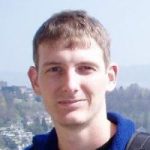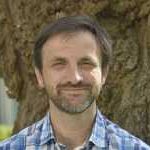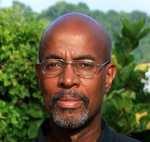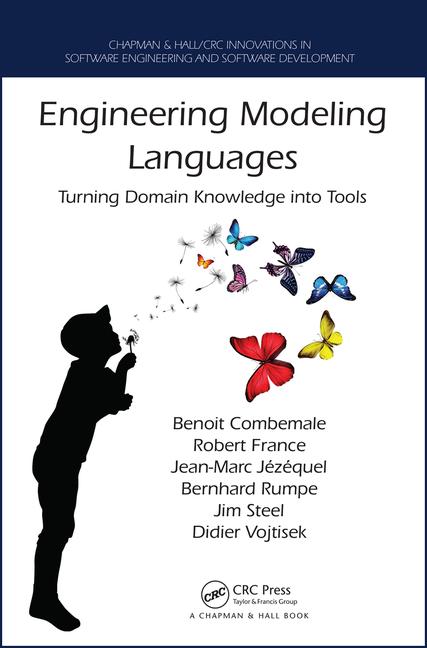Jean-Marc Jézéquel <Jean-Marc.Jezequel AT irisa.fr>, Bernhard Rumpe <rumpe AT se-rwth.de>,
Jim Steel <j.steel AT uq.edu.au>, and Didier Vojtisek<didier.vojtisek AT inria.fr>.
Dr. Benoit Combemale (Univ. Rennes 1, France)
 Since September 2009, I am Associate Professor at University of Rennes 1. I am evolving within the research team DiverSE (formerly Triskell), joint to the IRISA and Inria labs. I am interested in software engineering, including model driven software engineering (MDE), software language engineering (SLE) and software validation & verification (V&V); mostly in the context of (smart) cyber-physical systems and Internet of things. I am also teaching object-oriented programming, software and systems modeling, MDE, SLE and V&V in the engineering school ESIR. I also used to teach MDE and V&V worldwide in various engineering schools and universities.
Since September 2009, I am Associate Professor at University of Rennes 1. I am evolving within the research team DiverSE (formerly Triskell), joint to the IRISA and Inria labs. I am interested in software engineering, including model driven software engineering (MDE), software language engineering (SLE) and software validation & verification (V&V); mostly in the context of (smart) cyber-physical systems and Internet of things. I am also teaching object-oriented programming, software and systems modeling, MDE, SLE and V&V in the engineering school ESIR. I also used to teach MDE and V&V worldwide in various engineering schools and universities.
In 2015 I received my Habilitation in Computer Science (in French Habilitation à Diriger des Recherches) from University of Rennes 1. I earned a PhD in Computer Science in 2008 from University of Toulouse, awarded by the prize Leopold Escande. I graduated as M.Sc. in Computer Science in 2005 from University of Toulouse.
Since 2010, I have been a regular visiting researcher at the Computer Science Department of Colorado State University (USA), in the group of Prof. Robert B. France. From 2013 to 2016, I have been also on secondment at Inria as Research Computer Scientist.
Before joining University of Rennes 1, I was a postdoctoral fellow at INRIA between August, 2008 and August 2009 within the team AtlanMod. Prior to that, I was PhD candidate from 2005 to 2008 within the teams ACADIE and MACAO of the IRIT lab. I was also a teacher assistant at the IUT B de Blagnac (2004-2005) and at the INPT ENSEEIHT school of engineering (2005-2008). I used to teach in various engineering schools, such as INSA Toulouse (2006-2009), INSA Toulouse (2009-2012), ENSAI (2012-2016) and CentraleSupelec (2012-2016).
I co-authored 2 books, and more than 80 journal and conference publications in the fields of MDE, SLE and V&V. I also edited 2 books and various special issues in scientific journals. I’m a member of the Steering Committee of the SLE conference, and the Editorial Boards of the international journals SoSyM, COMLAN, and SCP. I have been the program co-chair of SLE 2014, and general co-chair of MODELS 2016. I also used to serve as program committee member for various conferences and workshops in software engineering. I am also very active in setting up and participating to satellite events of flagship conferences, including organizing workshops and panels. I coordinated and participated to many collaborative projects, either directly with industry or in projects funded by the European Union or the French government. I am also a founding member of the GEMOC initiative, an international effort to develop techniques, frameworks, and environments to facilitate the creation, integration, and automated processing of heterogeneous modeling languages.
Prof. Robert B. France (CSU, USA)
Robert B. France was one of the initial key authors of this book,and was fully devoted to its writing while enduring his illness.
Robert started his scientific life at the University of the West Indies, St. Augustine, Trinidad and Tobago, in the Caribbean. He graduated in 1984 and began working as a computer specialist in a project called USAID Census in the St. Vincent office of a US company. In 1986, he moved on to the Massey University in Palmerston, New Zealand, where he received his PhD in computer science in 1990. From 1990–92, he worked as a postdoctoral fellow at the University of Maryland, Institute for Advanced Computer Studies.
Robert was appointed as an assistant professor at the Computer Science and Engineering Department, Florida Atlantic University in Boca Raton, Florida, and stayed there for six years (1992–1998).
In 1999, he moved to the Colorado State University (CSU) in Fort Collins as a tenured associate professor and was promoted to a full professor in 2004.
In 2006–2007, Robert spent his sabbatical year at Lancaster University in the United Kingdom and at IRISA/INRIA in Rennes, France. He also made a number of extended scientific visits to the University of Nice in 2009 and 2012, to SINTEF in Norway in 2009 and 2011, and the University of Pau in 2003. From 2011, he held a position as a visiting adjunct professor at the University of the West Indies. In his visits and travels, he was often accompanied by his wife Sheriffa.
Robert was active at CSU in both organizational and scientific positions for as long as his health allowed him and even helped to organize the Modularity conference, which took place in Fort Collins in March 2015.
During his scientific life, Robert made a remarkable number of research contributions. His CV (last updated in August 2014) lists 33 journal articles, 10 book chapters, 1 invited paper, 107 refereed conference papers, 40 refereed workshop papers, and 13 proceedings and journal editorials.
Prof. Jean-Marc Jézéquel (Univ. Rennes 1, France)
 Jean-Marc Jézéquel is a Professor at the University of Rennes and Director of IRISA, the largest public research lab in Informatics in France. His interests include model driven software engineering for software product lines, and specificaly component based, dynamically adaptable systems with quality of service constraints, including reliability, performance, timeliness etc. He is the author of several books published by Addison-Wesley and of more than 150 publications in international journals and conferences. He was a member of the steering committees of the AOSD and MODELS conference series. He also served on the editorial boards of IEEE Transactions on Software Engineering, the Journal on Software and Systems, on the Journal on Software and System Modeling, and the Journal of Object Technology. He received an engineering degree in Telecommunications from ENSTB in 1986, and a Ph.D. degree in Computer Science from the University of Rennes, France, in 1989. After his PhD, he worked in the Telecom industry (at Transpac) and then joined the CNRS (Centre National de la Recherche Scientifique) in 1991. As a Professor at the University of Rennes since 2000, he has been Deputy Director of MATISSE Doctoral School (supervising about 550 PhD students in Math, EE, SE and CS) and head of the Language & Software Engineering Department, as well as the leader of an INRIA Team called Triskell, a world leading team in MDE.
Jean-Marc Jézéquel is a Professor at the University of Rennes and Director of IRISA, the largest public research lab in Informatics in France. His interests include model driven software engineering for software product lines, and specificaly component based, dynamically adaptable systems with quality of service constraints, including reliability, performance, timeliness etc. He is the author of several books published by Addison-Wesley and of more than 150 publications in international journals and conferences. He was a member of the steering committees of the AOSD and MODELS conference series. He also served on the editorial boards of IEEE Transactions on Software Engineering, the Journal on Software and Systems, on the Journal on Software and System Modeling, and the Journal of Object Technology. He received an engineering degree in Telecommunications from ENSTB in 1986, and a Ph.D. degree in Computer Science from the University of Rennes, France, in 1989. After his PhD, he worked in the Telecom industry (at Transpac) and then joined the CNRS (Centre National de la Recherche Scientifique) in 1991. As a Professor at the University of Rennes since 2000, he has been Deputy Director of MATISSE Doctoral School (supervising about 550 PhD students in Math, EE, SE and CS) and head of the Language & Software Engineering Department, as well as the leader of an INRIA Team called Triskell, a world leading team in MDE.
Prof. Jean-Marc Jezequel has directed about 30 PhD thesis, and participated to many collaborative projects, either directly with industry (e.g. CARROLL program between INRIA, CEA and Thales on Model Driven Development) or in the IST or ITEA frameworks of the European Union (in projects such as IST QCCS, ITEA CAFE or ITEA Families, IST SPEEDS, IST DIVA), as well as in many national project funded by the ANR. He was also involved into 4 European Networks of Excellence: Artist2 (Advanced Real-Time Systems Information Society Technologies), AOSD-Europe (Aspect Oriented Software Development), S-Cube (Software Services and Systems) and NESSoS (Engineering Secure Future Internet Software Services and Systems).
Prof. Jean-Marc Jezequel was a member of the programme committees of some of the most prestigious conferences in the software engineering field, such as ICSE, ASE, MODELS, AOSD or ECOOP. He was General Chair of AOSD’2010 and Programme Chair of the UML’2002 and AFADL’2003 conferences, and Conference Chair of TOOLS Europe 2000 and SPLC-Europe 2005.
He is also very active in setting up and participating to satellite events of these flagship conferences, including organizing workshops and panels, or giving tutorials.
Prof. Bernhard Rumpe (RWTH Aachen University and Fraunhofer FIT, Germany)
 Bernhard Rumpe is teaching Software Engineering at the RWTH Aachen University. Earlier he had positions at INRIA/IRISA, Rennes, Colorado State University, TU Braunschweig, Vanderbilt University, Nashville, and TU Munich. His main interests are rigorous and practical software and system development methods. This includes agile development methods like XP and SCRUM as well as model-engineering based on UML-like notations and domain specific languages. He has contributed to agile methods, as well as to the UML standard. Already in 2007 he has developed an autonomous car for the Darpa Urban Challenge using agile system development.
Bernhard Rumpe is teaching Software Engineering at the RWTH Aachen University. Earlier he had positions at INRIA/IRISA, Rennes, Colorado State University, TU Braunschweig, Vanderbilt University, Nashville, and TU Munich. His main interests are rigorous and practical software and system development methods. This includes agile development methods like XP and SCRUM as well as model-engineering based on UML-like notations and domain specific languages. He has contributed to agile methods, as well as to the UML standard. Already in 2007 he has developed an autonomous car for the Darpa Urban Challenge using agile system development.
He is author and editor of ten books and Editor-in-Chief of the Springer International Journal on Software and Systems Modeling (www.sosym.org).
Dr. Jim Steel (AEHRC, CSIRO, Australia)
 I am a researcher in and practitioner of software engineering, with a particular interest in modelling languages and their use to reduce the gap between domain concepts and IT solutions.
I am a researcher in and practitioner of software engineering, with a particular interest in modelling languages and their use to reduce the gap between domain concepts and IT solutions.
I have a background in model-driven software techniques, technologies, standards and research going back to 1997. I have been involved with the standardisation of a number of these through the Object Management Group (OMG), and their prototyping within a research context.
I was involved in the development of academic papers, standards documents and prototypes in the domain of Model-Driven Software Development. I was primarily responsible for the submission and adoption of a standard for textual notation generation for models, and was also involved in work on enterprise process modelling, organisational structure modelling, and languages for model transformation. In addition, I supervised a number of students in 6-month and year-long projects
Didier Vojtisek (Inria, France)
 I graduated from the engineer national school (ENSSAT, Lannion), speciality in computer science in 1997. From 1997 to 2001 I worked for the IT service company Elios informatique and had been sent in various missions for industrial clients.
I graduated from the engineer national school (ENSSAT, Lannion), speciality in computer science in 1997. From 1997 to 2001 I worked for the IT service company Elios informatique and had been sent in various missions for industrial clients.
Since november 2001, I work for the French National Institute for Research in Computer Science and Control (Inria) as a research engineer in the Development and Experimentation Department (SED). My main role is to develop software and promote of good software engineering practices in Inria research teams. I was first assigned in the Triskell team and in collaboration with Vertecs team. Since 2013, the Triskell team is now named DiverSE.
I specialized in research and development in model-driven engineering concepts, tools and applications. I am the main architect of Kermeta, an open source tool for building Model Driven solutions. I actively contribute to the newest sofware of the team relative to modeling and language engineering.
I participated to OMG standardization activities such as MOF 2.0 Query/View/Transformation and Common Variability Language.
I also supervise and mentor engineers on contract and postgraduate students.
I have some teaching activities on version management and model driven engineering at ISTIC, University of Rennes 1.



Recent Comments